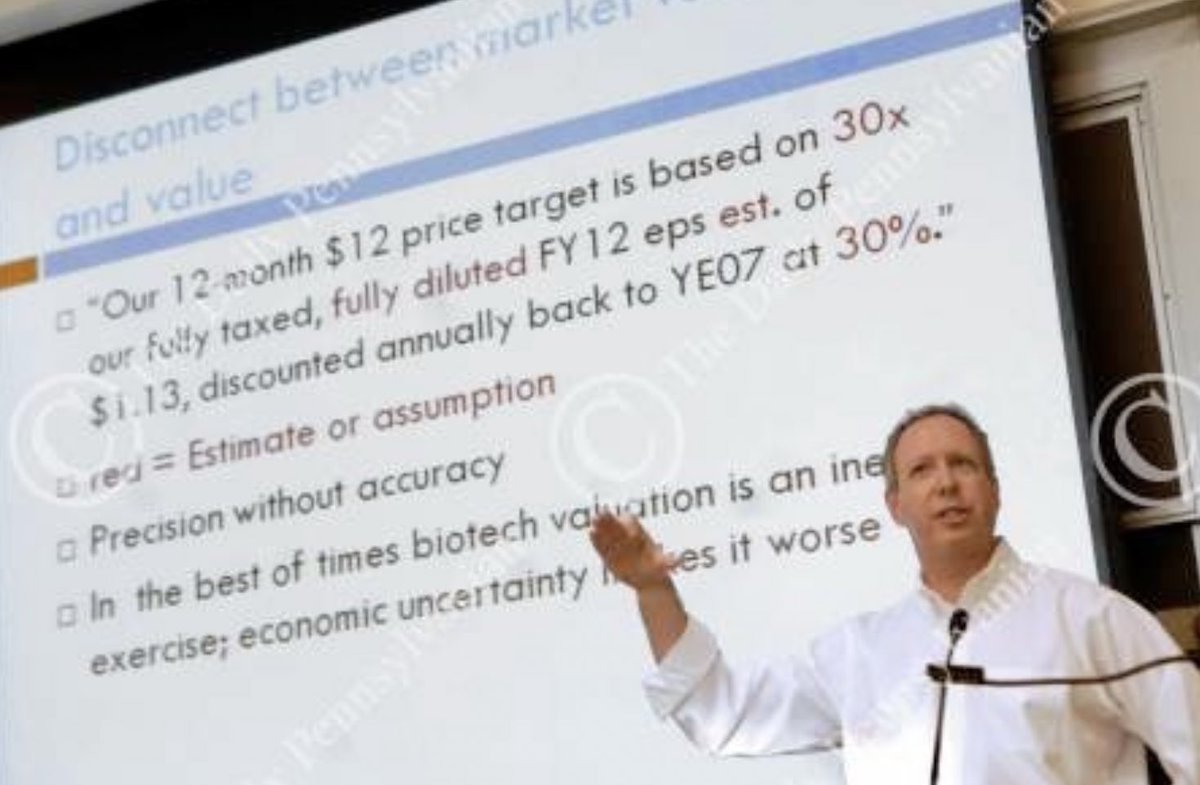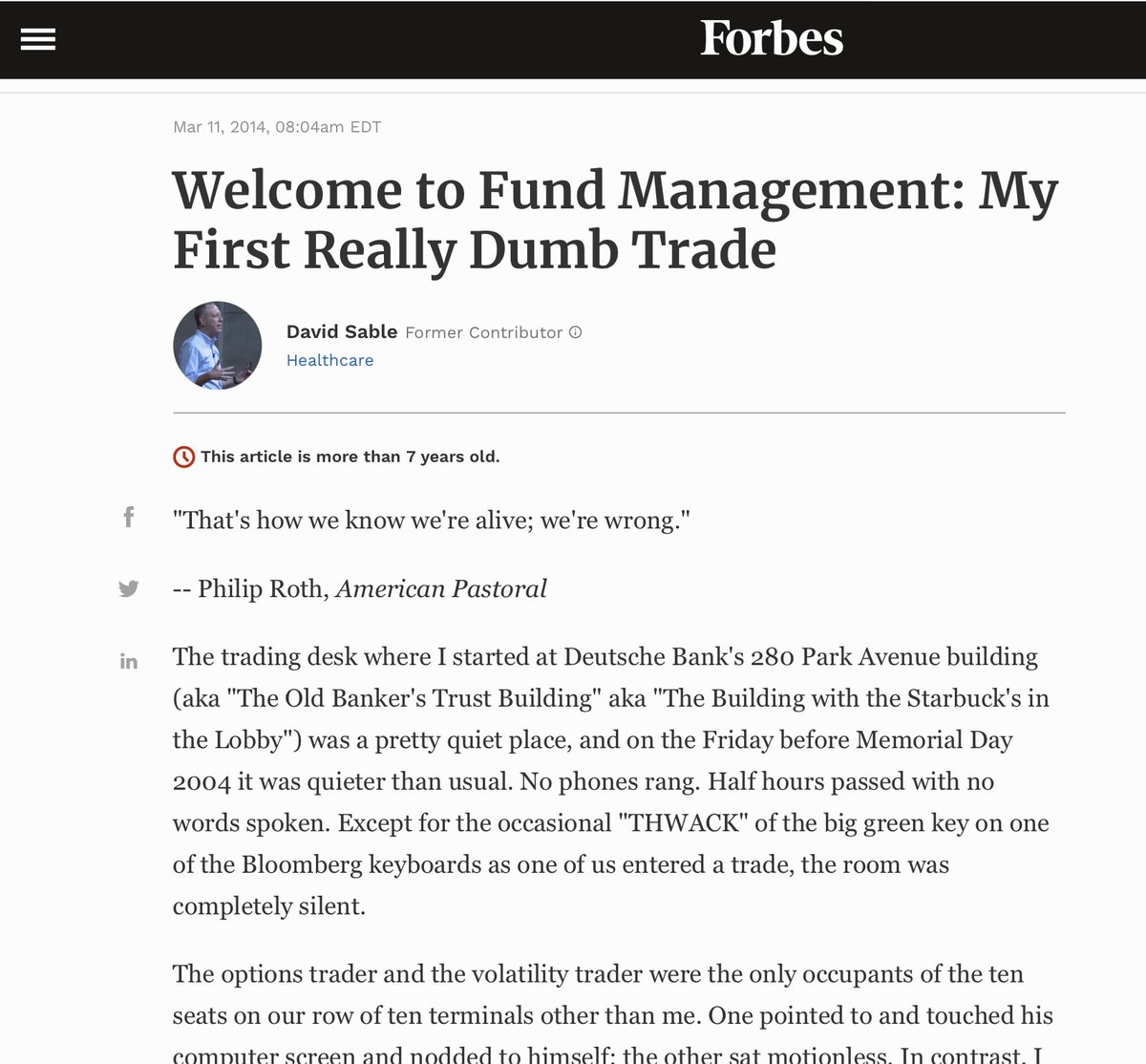
Biotech investing for the non-scientist part 2 or 3 (I lost track): when to buy and sell a biotech stock. 🧵
(Part of an ongoing series on risk management in #biotech for retail investors.)
(Not advice on what to buy or sell and definitely not a solicitation of any sort.)
(Part of an ongoing series on risk management in #biotech for retail investors.)
(Not advice on what to buy or sell and definitely not a solicitation of any sort.)

In biotechnology, where valuation is less an exercise in calculating the present worth of assets and future cash flows, and more an estimation of making more out of less in between financing events, the milestone calendar is particularly important.
Unfortunately, the definition of "value creation" is a moving target.
Every biotech company presentation has a milestone calendar. As I scan milestone calendar slides, I mentally cross off most (and in some unfortunate cases, all) of these supposed value creation events.
The intended message, ON THIS DATE THE STOCK WILL GO UP can often be translated as ON THIS DATE NO ONE WILL CARE.
Milestones fall into four categories:
Milestones fall into four categories:
1) FDA approval decision
2) clinical trial results
3) various types of regulatory filings, the most common being IND filings and trial starts
4) business development activity, such as partnerships and licensing agreements.
2) clinical trial results
3) various types of regulatory filings, the most common being IND filings and trial starts
4) business development activity, such as partnerships and licensing agreements.
Of these categories, only the first, an FDA approval, is an absolute, just about always, stock mover (in one direction or the other, and not always in the way we would predict.)
The last two categories often fall into the "who cares?" category. Category 3, regulatory filings and trial starts, while representing important events in the operation of the company, are foreseeable, should be predictable,…
and pretty much just tell us that the company is competent in carrying out the day-to-day activities of being a biotech company. While I know that filing for and getting a clinical trial started are complex, cat herding processes, they are what biotech companies do.
While a lot of hard work goes into these processes, there should be little drama surrounding these outcomes.
Category 4, development activity, is certainly important in value creation, but is, for the purpose of the buy side, a completely opaque process. In 10 years of meeting with biotech management teams,...
I've yet to come across the CEO who does not claim that a partnership is "just around the corner" or that there is "tremendous interest on the part of big Pharma."
Since everyone claims this to be true, the claim is worthless. Further, large pharmaceutical companies have small armies of middle level management business development people who kick the tires of far more small biotechs without actually entering the transactions.
The management team that over-calls the degree of interest that this activity signals may be demonstrating naïveté, not insight.
Which leaves us with clinical trial results, as unequivocal indications creations of value.
Sometimes.
Sometimes.
Caveat: Later stage trials are obviously more important than earlier stage trials, as the goal of the trials move from demonstrating safety to showing efficacy. Outside of oncology and infectious disease, phase 1 trials often tell us very little about whether or not a drug works.
Even in later stage trials, interim analyses rarely give conclusive evidence of efficacy, and the management roadshows that stress near-term interim analyses as market-moving events demonstrate either...
a lack of sophistication on the part of management investor perception or gross over-optimism regarding the likelihood of the study data being really great, really early.
Even data announcements at the end of a trial can be equivocal. When the announcement of top-line results contain only the primary study endpoint and a statistical p-value, with a promise of complete data announcements to come in a medical or scientific meeting,
this gives investors a less than full picture of the value creation from this "milestone.” It’s important to ask “what exactly is going to be announced?”
In other words, the implied “stock price inflection” — the date of which not only different strategies,
In other words, the implied “stock price inflection” — the date of which not only different strategies,
(“run-up” strategies, “buy on the dip” after the news, outcome handicapping etc) but also timing of stock sales by the company — may be way less than the prominence of the date on the milestone calendar suggests it will be.
Filter each predicted stock moving event through different filters: 1) the likelihood of it happening 2) is there really optionality to it? 3) if so, is it handicappable and can I do the handicapping? Can everyone else do it too? (Also ask: if so — why will it affect the stock?)
4) Very importantly: what are the expectations of the marketplace, particularly as is reflected in options pricing — and how will this blunt or magnify being your being right or being wrong about the event. If you are not really sure about what I am talking about,
…please exercise lots of caution in trading in biotech stocks using a trade the calendar / event prediction / optionality strategy. 

That said, a biotech investing/trading strategy that factors in the non-financial metric parameters of value creation in an intelligent and conservative way — is a great way to diversify a portfolio otherwise built on PE values and cash flows. (End)
• • •
Missing some Tweet in this thread? You can try to
force a refresh



